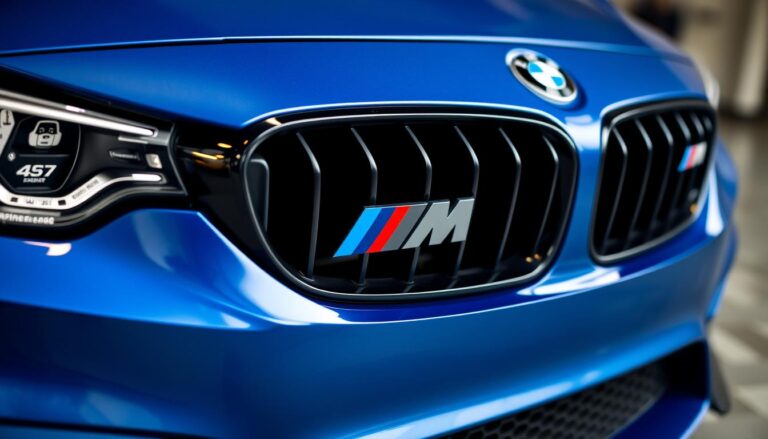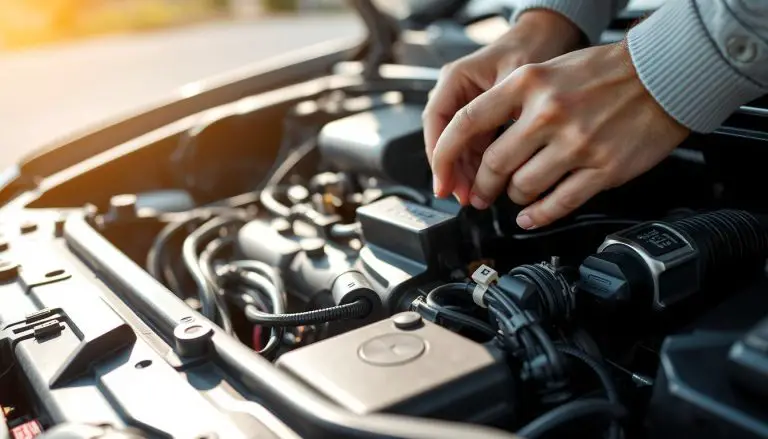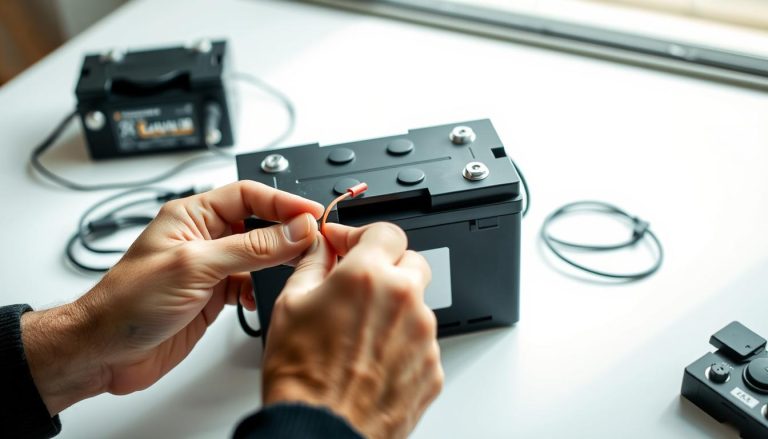In the realm of automotive longevity, the lifespan of BMW batteries is a topic of considerable interest among car enthusiasts. Typically, a BMW battery that is properly cared for can endure for approximately 5 to 7 years. Yet, numerous variables can sway this timeframe, encompassing driving patterns, ambient conditions, and upkeep routines.
The general car battery life expectancy is often cited as between 3 to 5 years, as underscored by Interstate Batteries. Elements such as extreme temperatures, frequent short journeys, and neglect in maintenance can drastically curtail a battery’s longevity. Grasping these elements can empower BMW proprietors to enhance their battery’s lifespan.
Key Takeaways
- BMW batteries typically last between 5 to 7 years.
- Factors such as driving habits and environmental conditions can affect battery lifespan.
- Proper maintenance is crucial for maximizing battery life.
- Extreme temperatures can reduce battery efficiency.
- Regular recharging can help prolong battery life.
BMW Battery Basics
Grasping the essence of BMW batteries is imperative for every proprietor. These batteries are engineered to deliver steadfast performance and enduring longevity. Their efficacy, though, hinges on several variables, including the battery’s type and the underlying technology.
Types of Batteries Used in BMW Vehicles
BMW automobiles predominantly employ Absorbent Glass Mat (AGM) batteries or Enhanced Flooded Batteries (EFB). AGM batteries are celebrated for their profound cycle capability, a trait often sought in vehicles equipped with start-stop technology. For a more detailed exploration of battery fundamentals, one may refer to Battery Basics.

Battery Technology in Modern BMWs
Contemporary BMWs integrate cutting-edge battery technology, encompassing regenerative braking and sophisticated battery management systems. These innovations aim to enhance battery performance and prolong its lifespan. Below is a comparative table outlining the salient attributes of AGM and EFB batteries.
| Battery Type | Key Features | Applications |
|---|---|---|
| AGM | Deep cycle capability, maintenance-free | Vehicles with start-stop technology |
| EFB | Improved cycle durability, enhanced performance | Standard and start-stop vehicles |
How Long Do BMW Batteries Last? The 5-7 Year Standard
BMW batteries are engineered to endure, yet their longevity is contingent upon various factors. Typically, BMW batteries are anticipated to endure between 5 to 7 years, a benchmark that underscores their superior quality and cutting-edge technology.
Average Lifespan Statistics
Research and data compilation reveal that the typical BMW battery endures approximately 6 years under standard driving conditions. Yet, this timeframe can fluctuate based on the model and the specific usage patterns.
Average Lifespan: 5-7 years
Median Lifespan: 6 years
Lifespan Differences Across BMW Models
Diverse BMW models exhibit disparate battery lifespans, influenced by differences in battery size, type, and vehicle electronics. For example, the BMW 3 Series may exhibit a marginally different battery lifespan compared to the BMW X5, attributed to their unique electrical systems and battery capacities.
Comparing BMW Battery Longevity to Other Luxury Brands
In a comparison of BMW battery longevity against other luxury brands, BMW emerges as a paragon of durability. An analysis with Mercedes-Benz and Audi reveals that BMW batteries frequently outlast or at least match their counterparts.

| Luxury Brand | Average Battery Lifespan |
|---|---|
| BMW | 5-7 years |
| Mercedes-Benz | 4-6 years |
| Audi | 5-6 years |
Factors Affecting BMW Battery Lifespan
Grasping the variables that influence BMW battery longevity is imperative for enhancing its endurance. Various elements can sway the duration of a BMW battery’s existence, necessitating an understanding of these factors. Such knowledge empowers BMW proprietors to proactively extend their battery’s lifespan.
Driving Habits and Their Impact
Driving practices significantly influence a BMW battery’s longevity. Frequent short excursions, aggressive maneuvers, and extended idling periods can all compromise battery health. In contrast, consistent, moderate driving practices foster battery health preservation. Frequent short trips hinder full charging, thus curtailing the battery’s lifespan.
Climate and Environmental Considerations
Climate and environmental conditions are pivotal. Extreme temperatures, whether scorching or frigid, profoundly affect battery performance and longevity. High temperatures lead to fluid evaporation, while low temperatures impede chemical reactions, diminishing efficiency. Utilizing shaded parking spots or employing sunshades can counteract extreme heat’s detrimental effects.
Vehicle Electronics and Power Demands
The escalating power requirements from vehicle electronics also bear on battery longevity. Contemporary BMWs, replete with numerous electronic functionalities, can drain the battery if not managed judiciously. Accessories such as GPS, premium sound systems, and aftermarket electronics augment battery load. Proper installation and management of these systems are critical.
Battery Management Systems in BMWs
BMW’s Battery Management System (BMS) is instrumental in preserving battery health. The BMS tracks the battery’s charge state, voltage, and temperature, ensuring operation within safe parameters. This system optimizes battery performance and extends its lifespan by averting overcharging and deep discharging.
Signs Your BMW Battery Is Failing
Recognizing the indicators of a failing BMW battery is imperative to avert unforeseen breakdowns. A battery in optimal condition is paramount for the consistent functionality of your vehicle.
Early Warning Indicators
Initial signs encompass dim or flickering headlights, a sluggish engine crank, and the presence of a foul odor or corrosion around the battery terminals. These symptoms imply that the battery is failing to retain a charge as it should.
Dashboard Warning Lights and Messages
Modern BMWs are equipped with advanced dashboard warning systems. Indicators or messages concerning the battery or charging system can signal a failing battery. For a comprehensive guide on dashboard symbols, refer to this resource.
Using Diagnostic Tools to Assess Battery Health
Diagnostic tools offer a precise evaluation of your BMW’s battery health. These instruments measure the battery’s voltage and condition, aiding in determining if a replacement is necessary.
Key signs of battery failure include:
- Dim or flickering lights
- Slow engine start
- Dashboard warning lights
- Corrosion around battery terminals
Early detection of these signs can avert being stranded due to a dead battery.
BMW Battery Maintenance Tips for Extended Life
Ensuring the longevity of your BMW battery necessitates diligent maintenance. Regular upkeep and vigilance can substantially prolong its lifespan, averting unforeseen malfunctions.
Routine Maintenance Practices
To maintain your BMW battery’s integrity, adherence to a routine maintenance regimen is imperative. This regimen encompasses:
- Inspection and cleansing of battery terminals to prevent corrosion
- Verification of the battery’s secure fastening to mitigate damage from vibrations
- Monitoring of the battery’s age, with timely replacement planning
Regular inspections are instrumental in detecting potential issues before they escalate into significant problems.
Professional Service Recommendations
While certain maintenance tasks can be executed by the vehicle’s owner, others necessitate professional intervention. It is advisable to have your BMW battery evaluated during routine service visits. Professionals are equipped to:
- Conduct comprehensive diagnostic assessments to gauge battery health
- Offer expert advice on optimal replacement alternatives when necessary
Professional service guarantees that your battery receives meticulous care, with any emergent issues promptly addressed.
DIY Maintenance Steps
For BMW proprietors inclined towards self-maintenance, several DIY measures can be undertaken:
- Verification and replenishment of the battery’s electrolyte level (if applicable)
- Utilization of a battery tender or trickle charger during periods of inactivity
- Avoidance of deep discharging to preserve battery health
Adherence to these DIY maintenance steps can significantly contribute to the prolongation of your BMW battery’s lifespan.
Battery Registration and Coding
Post-battery replacement, it is imperative to register the new battery with your vehicle’s onboard computer system. This procedure, commonly referred to as battery coding, ensures that the vehicle’s electrical system is informed of the new battery’s characteristics, enabling optimal management thereof.
Battery registration and coding are critical steps that must not be overlooked to preserve the vehicle’s optimal performance.
BMW Battery Replacement: Options and Costs
Grasping the nuances of BMW battery replacement is paramount for a well-informed decision-making process. This entails a thorough examination of various factors, including the battery type and the installation method—whether professional or DIY.
OEM vs. Aftermarket Battery Options
The initial decision in BMW battery replacement revolves around the choice between an Original Equipment Manufacturer (OEM) battery and an aftermarket alternative. OEM batteries are meticulously crafted for BMW vehicles, ensuring unparalleled compatibility and performance. Their premium price tag, though, is a significant consideration. In contrast, aftermarket batteries present a cost-effective option, albeit with potential variability in quality and compatibility.
The selection between OEM and aftermarket batteries hinges on several variables, including budget, vehicle specifications, and individual preferences. While OEM batteries guarantee quality and compatibility, aftermarket options can serve as a cost-effective alternative when thoroughly researched.
Cost Comparison Across BMW Series
The expense of BMW battery replacement exhibits considerable disparity across different BMW series. Typically, luxury models and those equipped with advanced technology necessitate more costly batteries. For example, batteries for the BMW 7-Series are generally more expensive than those for the 3-Series.
Accurate estimation of replacement costs necessitates a detailed understanding of the specific battery requirements for your BMW model. Consulting with a dealership or a professional mechanic can offer invaluable insights into the financial implications involved.
Professional Installation vs. DIY Replacement
Another pivotal consideration is the choice between professional installation and DIY replacement. While DIY can reduce labor costs, it demands technical proficiency and the appropriate tools. Professional installation ensures the battery is correctly fitted and registered with the vehicle’s computer system, essential for optimal performance.
For many BMW owners, the assurance of professional expertise and the quality of workmanship make professional installation the preferred option. Yet, for those adept in DIY repairs, following proper procedures can lead to cost savings.
Conclusion
Ensuring the longevity of your BMW battery hinges on diligent care and maintenance, a critical aspect for achieving the anticipated 5-7 year lifespan. Grasping the variables that influence battery longevity empowers you to implement strategies for its prolonged service.
Adherence to routine maintenance, such as periodic checks on the battery’s charge state and meticulous upkeep of the terminals, serves as a bulwark against premature degradation. Concurrently, a conscious approach to driving habits and the avoidance of extreme environmental conditions are pivotal in extending battery life.
Armed with the insights from this discourse, you are positioned to guarantee your BMW battery’s consistent performance over the long haul. Optimal BMW battery care ensures uninterrupted vehicular operation, obviating concerns related to battery malfunctions.
Irrespective of whether your BMW is a contemporary marvel or a vintage gem, the imperative of battery care cannot be overstated. Adherence to the recommendations presented herein will not only prolong your battery’s life but also uphold the integrity of your vehicle’s overall condition.
FAQ
How long do BMW batteries typically last?
The longevity of BMW batteries spans between 5 to 7 years, influenced by driving habits, environmental conditions, and maintenance practices.
What type of battery is used in BMW vehicles?
BMWs employ either Absorbent Glass Mat (AGM) batteries or Enhanced Flooded Batteries (EFB), contingent upon the model and production year.
How can I extend the life of my BMW battery?
To prolong your BMW battery’s life, adhere to regular maintenance, eschew extreme temperatures, and curtail excessive battery usage.
What are the signs that my BMW battery is failing?
Indicators of a failing BMW battery include dim or flickering headlights, sluggish engine start, dashboard alerts, and engine start difficulties.
Can I replace my BMW battery myself?
While DIY replacement is feasible, it is advisable to entrust a professional mechanic to ensure correct installation and battery registration.
How much does it cost to replace a BMW battery?
Replacement costs for BMW batteries fluctuate based on model and type, ranging from approximately 0 to over 0 for original equipment manufacturer (OEM) batteries.
What is the difference between OEM and aftermarket BMW batteries?
OEM BMW batteries are crafted to BMW’s exacting specifications, whereas aftermarket batteries may not adhere to these standards, potentially compromising performance and longevity.
How do I know if my BMW battery needs to be replaced?
Employ diagnostic tools or seek professional assessment to gauge your BMW battery’s condition and determine if replacement is necessary.
Can driving habits affect BMW battery lifespan?
Affirmatively, driving habits such as frequent short trips, exposure to extreme temperatures, and aggressive driving can significantly impact BMW battery longevity.
What is battery registration and coding, and why is it important?
Battery registration and coding is a critical process that ensures the new battery is acknowledged by the vehicle’s onboard computer, thus optimizing its performance and extending its lifespan.


